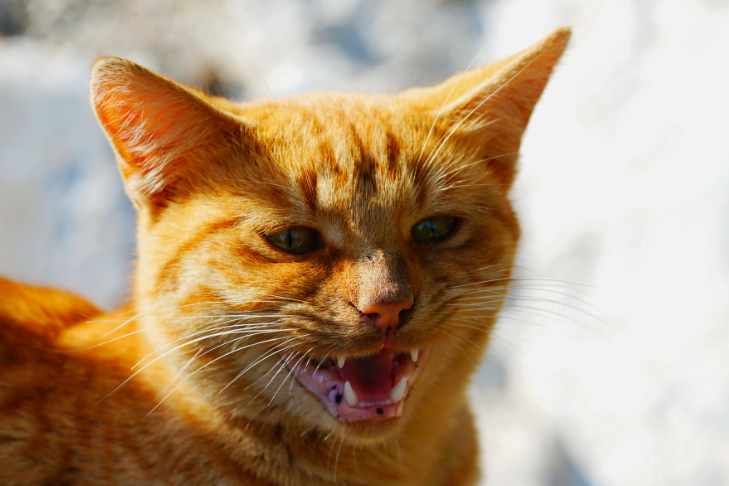Why Is My Cat Meowing So Much?

By Sassafras Lowrey CPDT-KA
Do you have a cat who is always “talking” to you? Meowing and other vocalizations are one of the primary ways that our cats can communicate with each other, and with us. But why do cats meow so often? Vocalizations of all sorts are ways that cats can express how they are feeling or when they want or need something. Meowing, hissing, and purring are common vocalizations cats utilize when they like or dislike what is going on around them. Cats will meow to communicate with other animals in the home as well as with people. Some cats are chattier than others, and cats usually have good reasons for why they are meowing.
1. Attention Seeking
Cats sometimes get a reputation for being aloof, but they are social animals who are highly bonded to their families. One of the most common reasons that cats might begin regular vocalizing is as a means of communicating directly with us. Specifically, many cats will vocalize when they feel as though they are not getting enough attention. Many cats like to “talk” to their owners when they arrive home from work or get up in the morning. This is your cat’s way of saying hello, recognizing that you have returned, and trying to communicate that they would like to spend some quality time with you. For some cat’s that meowing might mean they are looking for some pets or cuddles, while others are ready for you to pull out the interactive toys and start playing.
2. Begging For Food
Although begging for food has a reputation of being a dog activity, many cats also beg for food in the kitchen and can be quite loud about their demands. If your cat is hoping you will decide to share your snack, or the meal you’re preparing they may begin meowing at you. Behaviors that have been reinforced in the past are the most likely to be repeated in the future. If you or someone in your family has thought it was cute when your cat joins you in the kitchen for a “conversation” while you cook and has rewarded that with a little treat, chances are your cat will be more likely to continue meowing at you while you’re cooking. Similarly, cats are very good at knowing what time they are usually fed and can be very vocal with reminding their people when it’s approaching mealtime.
3. Expressing Needs
Meowing at people is a primary way cats are able to attempt to communicate their wants and needs. Sometimes those needs are more obvious than others like if your cat is meowing because you’re eating dinner and they want a bite. Other times it may take a bit of trial and error to figure out what exactly your cat wants. Instead of getting frustrated when your cat is meowing, try to look at things from their perspective. Your cat might be trying to get to a toy that has gotten stuck under furniture, wanting to be with you if you are behind a closed door. By watching your cat chances are you’ll be able to figure out what they are trying to communicate.

4. Boredom
Cats might spend a lot of their days sleeping but that doesn’t mean they can’t get bored! A common reason for excessive vocalizations from cats is because they don’t have anything more interesting to do. Cats that don’t get enough attention, physical exercise, and mental enrichment can easily become bored. When cats are bored, they may begin to engage in less than desirable activities such as being more destructive with scratching, but they can also begin vocalizing more. If your cat seems needy or start vocalizing more look at your cat’s daily routine and see if there are ways you can increase enrichment and play opportunities.
5. Signs of discomfort
Although meowing is common for cats, excessive vocalizations or a change in vocalizations for cats can also be a sign of pain, discomfort, or illness. Most cat owners assume that purring means their cat is happy, but some cats will start purring more to self-soothe when they are in pain or uncomfortable. Any increase or significant change in vocalizations is a sign that you should schedule an appointment with your cat’s veterinarian for a full examination.
6. Breed Considerations
How chatty a cat is often coming down to individual personality, but there are also breed considerations to keep in mind. While all cat’s meow and make other vocalizations to get attention, some breeds of cats are naturally more vocal than others. Bengal cats, Ocicat, Burmese, Maine Coons and Siamese are known to be especially chatty cats. The Cat Fanciers Association, a national organization dedicated to purebred cats is a great resource for learning more about the personality traits of different cat breeds.
Although your cat’s meowing can get annoying to some people it’s important to remember that vocalizations are a way that cats can communicate with you about their wants and desires. If your cat is very vocal and health conditions have been ruled out it is possible to encourage your cat to be quieter by using treats, toys, and play to reward your cat when they are quiet. Ultimately communication between you and your cat is important, and vocalizations are a way that cats can communicate with us what they like, want, and need.
***
Considering CBD For Cats
CBD for cats can be a great option for felines who have extra stress or joint relief. Even completely healthy cats can benefit from a daily supplement formulated just for felines that will keep them more comfortable and relaxed – both now and in the future.


